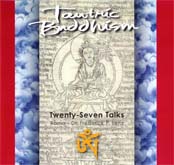
Tantric Buddhism
Focus and Meditation
The practice of meditation is emptying the mind.
When the mind is empty, completely empty, it's perfect meditation. It's really that simple. There are a variety of different approaches to emptying the mind. All of them work equally well. We can just stay with one; we can use a number of them. It really doesn't matter; it's a question of personal choice. What we're doing is stopping thought. But really, before that, we're learning to control thought. And really, before that, we're learning just to sit down and focus on something.
I have a simple prescription method for learning how to meditate, which, if you do it, works very, very well. The main thing that you need is not really creativity but consistency. Creativity is a nice quality but it doesn't have much to do with learning to stop thought. Consistency does. Consistency really involves just doing something once, each time, and not thinking about time or space or repetition. You just live it once. Forever. And that's consistency. That's perfect consistency.
To meditate, what I suggest a person do is, of course, they sit in an upright position - if you lie down you relax too much and you don't really have the focus of concentration necessary to meditate. You can sit in a cross-legged position on a rug, you can sit in a chair. All that matters is that the back is relatively straight, the spine is straight. What I suggest a person do for their practice is to focus on something with their eyes open for half the meditation, and for the second half of the meditation to focus on something with their eyes closed. The length of time depends upon how long a person has been meditating. If a person wants to start meditating, I recommend that they meditate for fifteen minutes a day, once a day. After they've been meditating perhaps for a few weeks, then I would suggest that they double the time and go to half an hour. After several months, I would suggest that they increase the time to 45 minutes and then, that they stay at 45 minutes for a while, until they've been meditating about a year, every day consistently. After a year, if a person chooses to, they can increase the time, perhaps to an hour - maybe for another six months or a year. Then maybe after two years, go up to an hour and a half, ninety minutes.
The primary meditation, which is done in the early part of the day, after waking, is the meditation I'm discussing. It is nice to have a second meditation in the early evening, or about halfway or two thirds of the way through the day. It renews the initial meditation. It renews our contact with the divine, with the infinite light. That meditation should be of fairly short duration unless you're just very inspired - maybe 30 minutes, 15 minutes if you're new. But the important meditation is the meditation that you do to start the day because when you wake up from sleep, the mind is relaxed and you've not yet set it into motion. It has the motion of the astral dream experiences, but they're slight. Whereas, after you've started to have conversations, act in the world, perceive things in a sensorial way, the mind gets very stimulated; it picks up a lot of impressions and it's harder to move into the qualityless state of no thought.
The best time to meditate is when you first get up, whether it's morning, evening or afternoon, depending upon your schedule. It's nice to be clean; it wakes you up and just takes a lot of the energies off. Water neutralizes strange energy, unpleasant energy. So if you can take a shower before your - we'll call it the morning meditation, regardless of when you do it - that's a good idea. Or at least wash your hands and face. But water takes a lot of the strange energies that you've picked up in dreaming and the human aura of the planet Earth and washes it away and it makes it easier to meditate.

